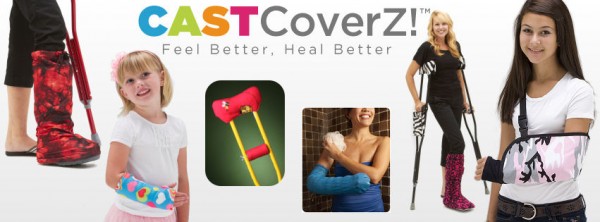How to Know if a Bone is Broken in Adults
17th Jul 2013
Did you know you are born with over 270 bones? But, many of these fuse together as you grow, leaving a total of 206 separate bones in an adult! Broken bones (also known as fractured bones) are common for both children and adults. In our previous post, "How to Know if a Bone is Broken in Children", we learned that most fractures are usually due to a fall, athletic activity, or car accident. In addition, some people can be more prone to breaks because of genetic conditions or bone disease that weakens bones. An X-ray image of a fractured radius showing the characteristic Colles' fracture with displacement and angulation of the distal end of the radius.
Adults most commonly fracture leg and ankle bones, along with forearms. One-sixth of all fractures treated among adults are known as Colles' fractures. A Colles' fracture is a fracture of the distal radius in the forearm with dorsal (posterior) displacement of the wrist and hand (commonly referred to as a "dinner-fork" or "bayonet" fracture.) They are most common in the elderly and often seen in people with osteoporosis.

A doctor may suspect a fractured bone simply based on the appearance of the injured area. Following is a list of signs and symptoms you can use to help determine whether or not a bone is broken in an adult.
How to know if a bone is broken in adults:
- Is the area swollen and bruised?
- Is the limb hanging at a funny angle or look out of place?
- Is the bone sticking out through the skin? Did the injured person feel or hear anything crack?
- Can they move the injured area?
- Does it hurt when touched?
- Most importantly, consult a doctor. X-rays of the injured area will usually confirm the diagnosis of a broken bone, although stress or hairline fractures can be difficult to detect on an x-ray. If the x-ray does not show a fracture, but after 7-10 days, there is still pain or something just doesn't feel quite right, do not hesitate to ask for another. By that time, calcium "ribbons" will be visible. Calcium ribbons occur only when a bone has broken or suffered a Greenstick fracture (a mild bone fracture or bone bend.)
If you suspect a broken bone, do your very best to keep the injured area still, until you know for sure what type of orthopedic injury you are dealing with. Once you know you're dealing with a fracture and have been casted, you'll definitely want to visit CastCoverZ! CastCoverZ! provides fun and functional products that comfort orthopedic patients, from cast covers and walking boot covers, to CrutchWear crutch accessories, we’ve got you covered! OH, and don't forget you'll need to keep that cast DRY with DryPro waterproof cast protector, and for some much needed relief from that itchy, stinky cast, try CastCooler! Feel Better, Heal Better, and be sure to check out our previous post, "How to Know if a Bone is Broken in Children."


